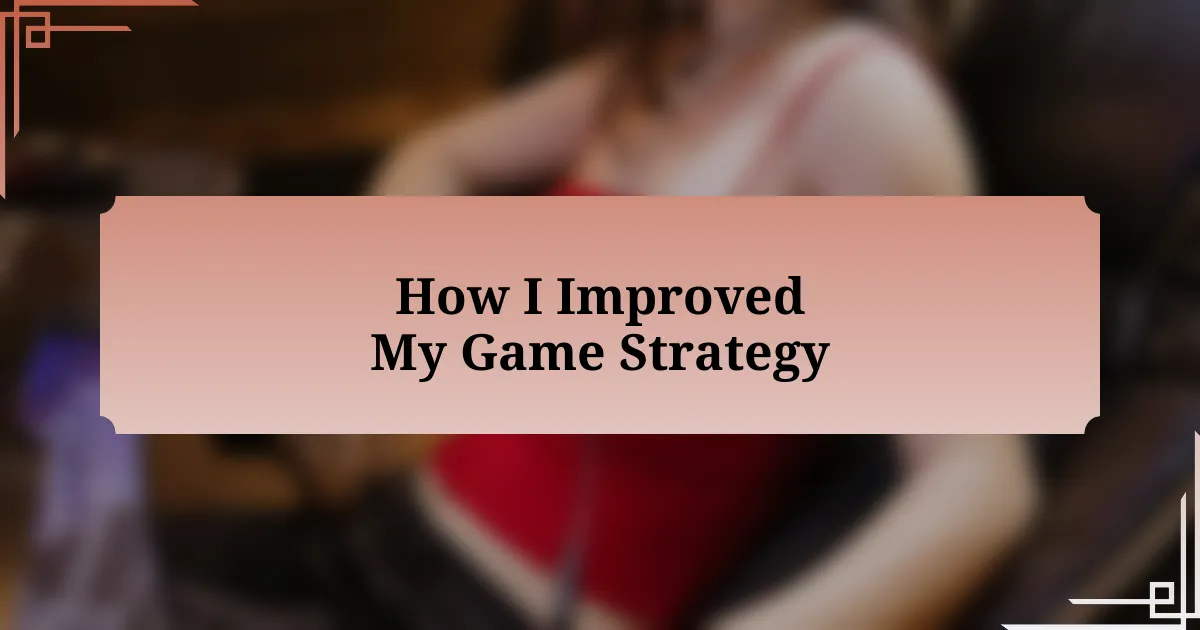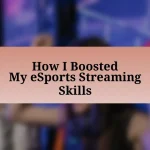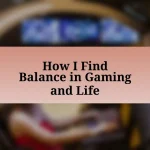Key takeaways:
- Understanding and analyzing both personal and opponents’ strategies enhances gameplay effectiveness in eSports.
- Communication and teamwork are critical for successful strategy execution; adapting plans mid-game can lead to victory.
- Regular self-assessment and setting specific improvement goals significantly improve performance and motivation.
- Implementing new strategies in practice requires patience, experimentation, and collaboration with teammates for optimal results.
Author: Evelyn Hartley
Bio: Evelyn Hartley is an award-winning author known for her compelling narratives and richly drawn characters. With a background in psychology and literature, she weaves intricate tales that explore the complexities of human relationships and the intricacies of the human psyche. Her debut novel, “Whispers in the Dark,” was celebrated by critics and readers alike, earning her a dedicated following. Evelyn’s work has been featured in various literary journals and anthologies, and she frequently speaks at writing conferences and workshops. When she’s not writing, she enjoys hiking in the mountains and volunteering at her local animal shelter. She resides in Seattle with her two rescue dogs, Luna and Milo.
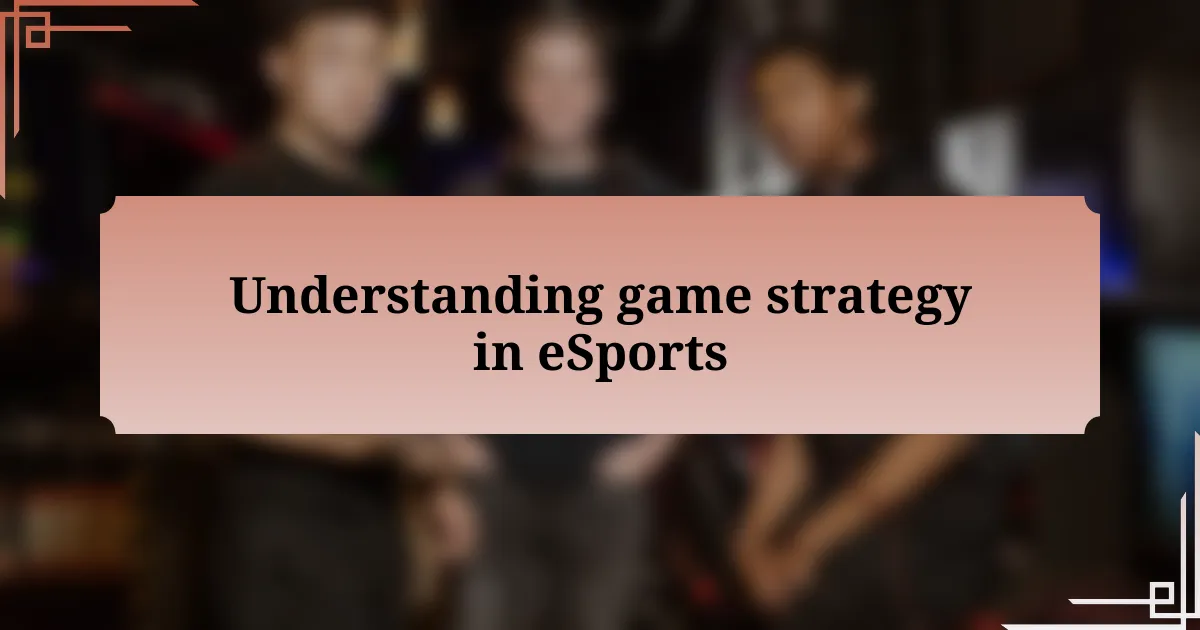
Understanding game strategy in eSports
In my journey through eSports, I’ve often found that understanding game strategy is more than just knowing the rules. During a tense match of my favorite MOBA, I realized that watching my teammates’ movements and predicting their decisions could make all the difference. What if we took a moment to step back and analyze not just our actions, but our opponents’ strategies too?
I’ve experienced firsthand how a well-crafted strategy can turn the tide of a game. There was one instance where our team prioritized communication, leading us to successfully counter an aggressive rush by the enemy. It was exhilarating to witness how clear calls and strategic positioning transformed our gameplay. Can you think of a time when teamwork elevated your eSports experience?
Ultimately, embracing a variety of strategies is vital in eSports, blending everything from offensive plays to defensive tactics. The balance between adapting on the fly and sticking to your game plan is crucial. I often reflect on how each match teaches me something new, shaping my approach for the next challenge. Isn’t it fascinating how every game offers a fresh opportunity to refine our strategies?
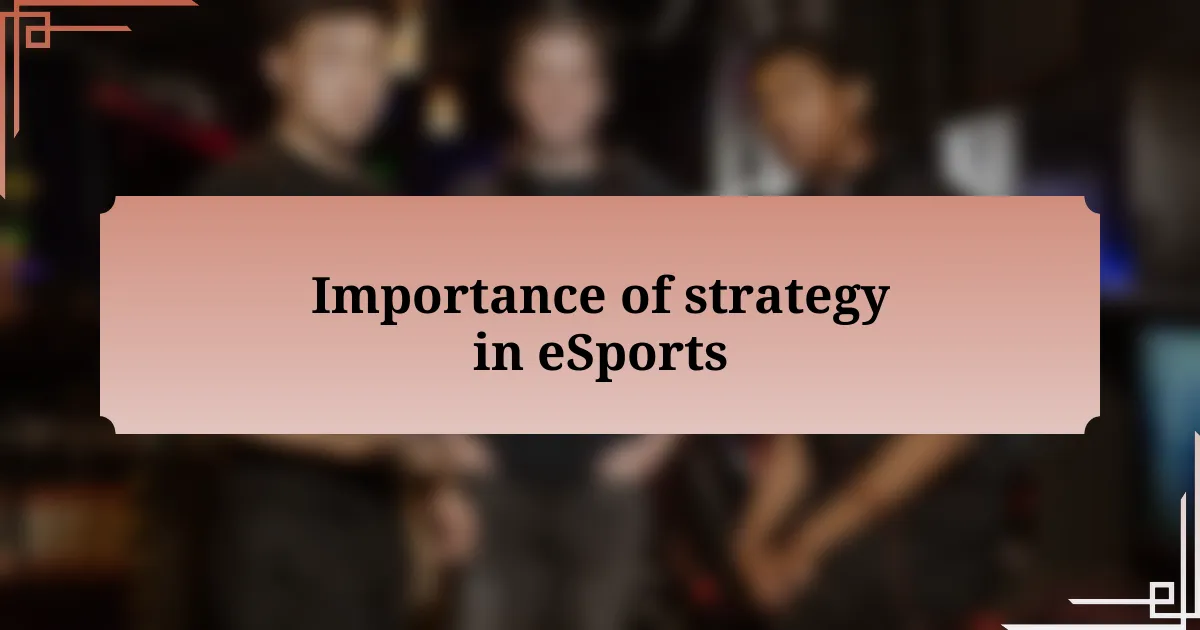
Importance of strategy in eSports
When it comes to eSports, strategy isn’t just a side note; it’s the backbone of any serious gameplay. I remember one match in a competitive shooter where my team ignored our planned strategy and went rogue. We were quickly outmaneuvered and fell apart; it hit me hard that without a clear game plan, even the most skilled players can falter. Have you ever found yourself in a similar situation, where going off-script led to disaster?
Engagement is a key component of strategy, and during one tournament, we faced a team that adapted our tactics. We had to think on our feet, adjusting our approach mid-game to regain control. The pressure was intense, but that experience taught me the power of flexibility in strategy. Isn’t it rewarding when you can outsmart opponents who seem a step ahead of you?
Finally, the importance of learning from defeats cannot be overstated. After a tough loss, I analyzed our gameplay, discovering gaps in our strategic execution. Each failure turned into a lesson, shaping my mindset and preparing me for future competitions. What strategies do you find are worth dissecting after a match? It’s all about evolving with each game, isn’t it?
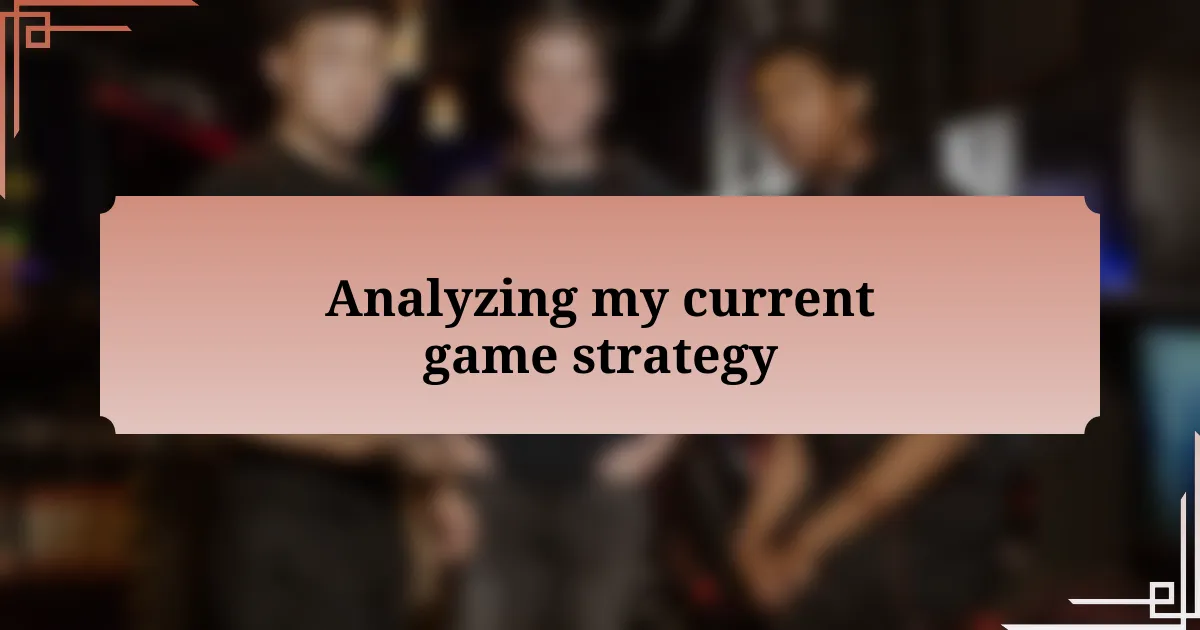
Analyzing my current game strategy
Evaluating my current game strategy has been an eye-opening journey. Recently, I took a deep dive into my decision-making processes during matches and realized I often defaulted to overly aggressive plays. This tendency not only left me vulnerable but also disrupted team cohesion. Have you ever noticed how a single reckless move can throw off an entire team’s rhythm?
One memorable instance that highlighted this was during a ranked match, where my urge to secure kills led to a swift elimination. I felt the frustration from my teammates as we struggled to recover. Reflecting on that moment, I acknowledged the significance of playing smart over playing hard. It’s fascinating how much control one person can exert over a match by simply adhering to a strategic framework.
Furthermore, I now actively analyze my opponents’ tactics, which was a shift from my previous focus solely on my own gameplay. By studying their strategies—what works and what falters—I’ve begun to adjust my approach accordingly. Isn’t it intriguing how recognizing an enemy’s movements can enhance your gameplay? This not only improves my performance but also deepens my understanding of the game’s dynamics.
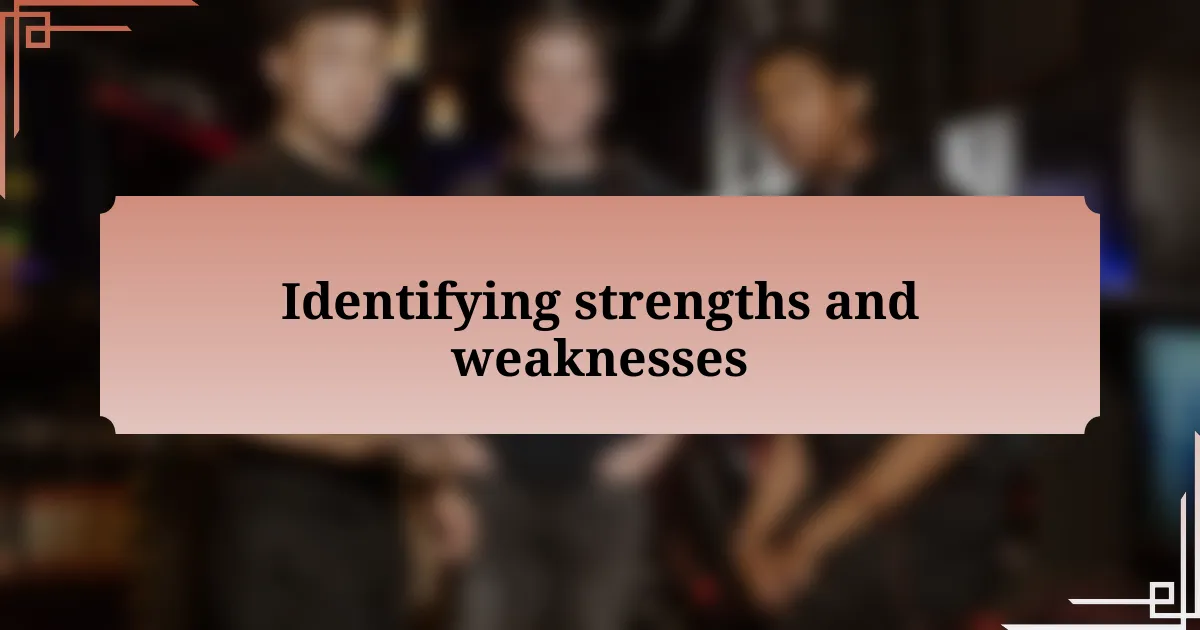
Identifying strengths and weaknesses
Identifying my strengths and weaknesses in the game has been a crucial step in refining my strategy. I remember a time when I excelled at supporting teammates during intense situations, which boosted our overall morale. Conversely, I often found myself struggling with map awareness, leading to missed opportunities and unfortunate losses. How often do we overlook these small but impactful aspects of our gameplay?
As I reflected on my journey, the importance of self-assessment became clear. During one particularly frustrating session, I made a conscious effort to record my gameplay and later review it. I was surprised to see how my best plays unfolded from moments of patience and calculated risks, while most of my failures stemmed from impulsive decisions. Isn’t it incredible how understanding our patterns can lead to significant improvements?
In discussions with fellow gamers, I’ve discovered that many share a similar sentiment about the constant evolution of strengths and weaknesses. It seems that what you may excel at one season could potentially become a weakness the next. This ever-changing landscape is what keeps the game exciting and challenging. Recognizing this has allowed me to remain adaptable and focused on both reinforcing my strengths and addressing my weaknesses. Have you taken the time to pinpoint your own?
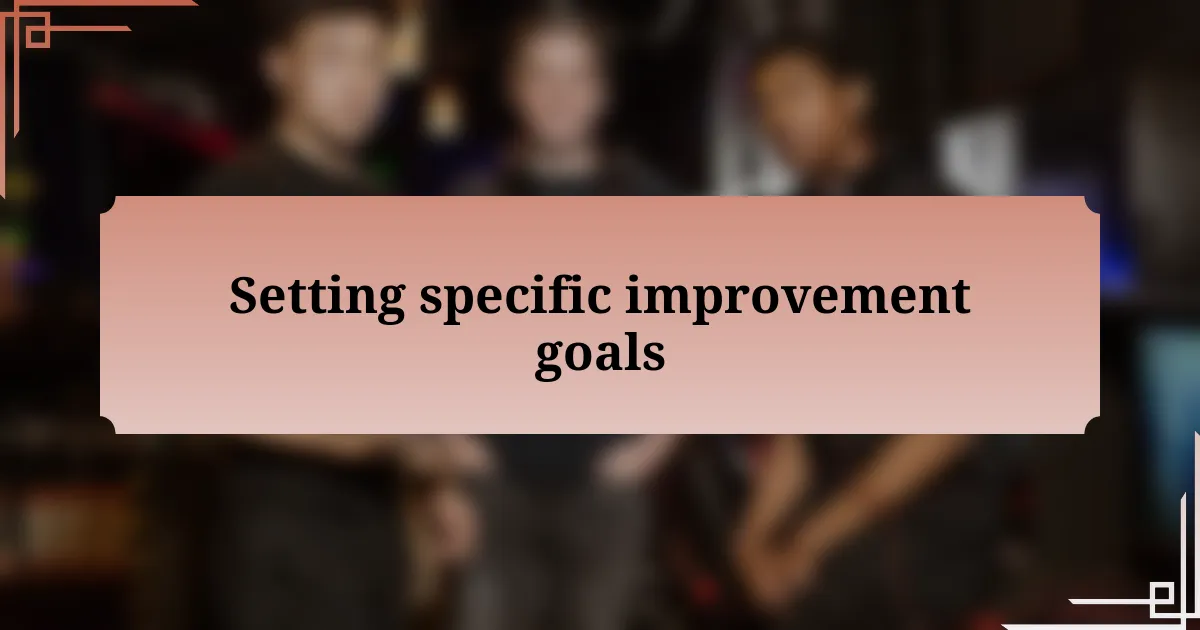
Setting specific improvement goals
Setting specific improvement goals has transformed my gaming experience. I recall the time I decided to work on my communication skills during matches. I set a goal to give clear callouts at least three times per game. This not only helped improve team coordination but also made me feel more engaged with my teammates. Have you ever noticed how clear communication can turn the tide in a match?
In another instance, I realized my aim was lacking, so I created a focused plan. I committed to 30 minutes of dedicated aim training each day. It was challenging at first, but slowly, I began noticing improvements in my accuracy. Each small victory felt like a step forward, reigniting my passion for the game. Isn’t it amazing how specific goals can lead to tangible results?
I’ve learned that setting goals isn’t just about improving skills, but also about maintaining motivation. When I aimed to play more strategically, I kept a journal to track my progress and reflect on what I learned after each session. This practice not only reinforced my objectives but also enabled me to celebrate my progress, no matter how small. How do you keep yourself accountable for your own goals in gaming?
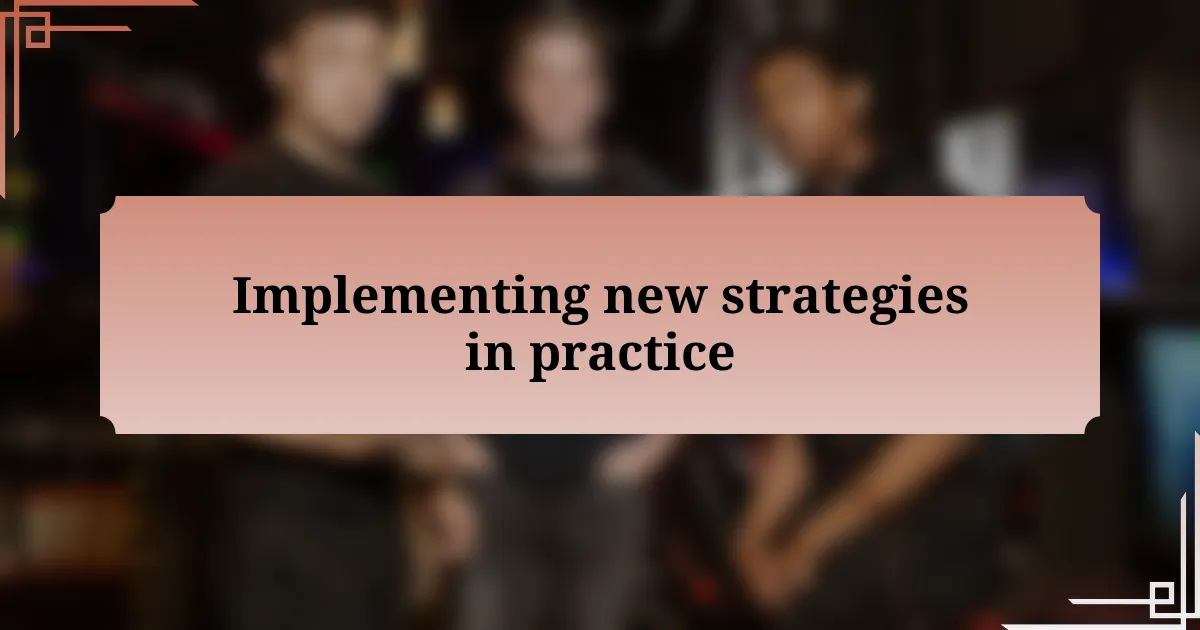
Implementing new strategies in practice
Implementing new strategies in practice requires a willingness to adapt and experiment. I remember when I decided to integrate flanking maneuvers into my gameplay. The first few attempts were clumsy, and I often found myself out of position. However, as I gradually refined my approach, I started catching opponents off-guard, leading to game-changing plays. Have you ever felt that thrill when a new tactic pays off?
It’s important to approach practice with a mindset of trial and error. On one occasion, I spent an entire afternoon practicing a new combination of abilities with my favorite character. At times, it felt frustrating when things didn’t click immediately, but over time, my consistency improved, and I gained the confidence to try it in actual matches. This process made me realize that embracing failure is part of refining your strategies. How do you react when a new technique fails during practice?
Incorporating new strategies into practice means also finding the right environment. I found that training with friends or in a team setting helped me apply my new tactics more effectively. The feedback I received from them was invaluable, enabling me to tweak my approach on the fly. Have you considered how collaboration can enhance your learning experience? There’s something invigorating about sharing ideas and improving together.

